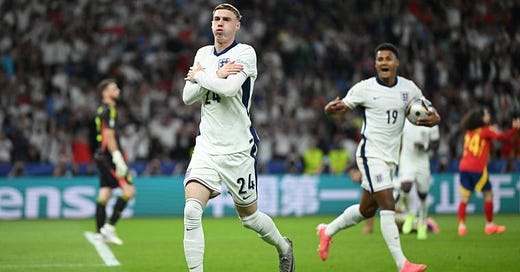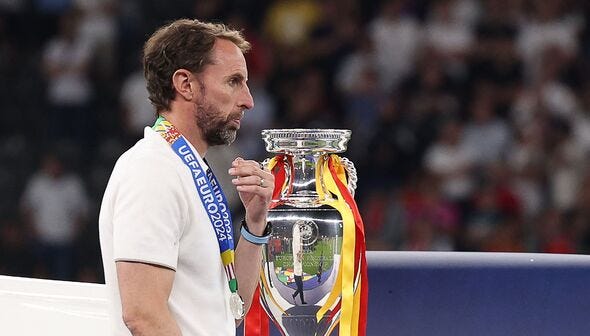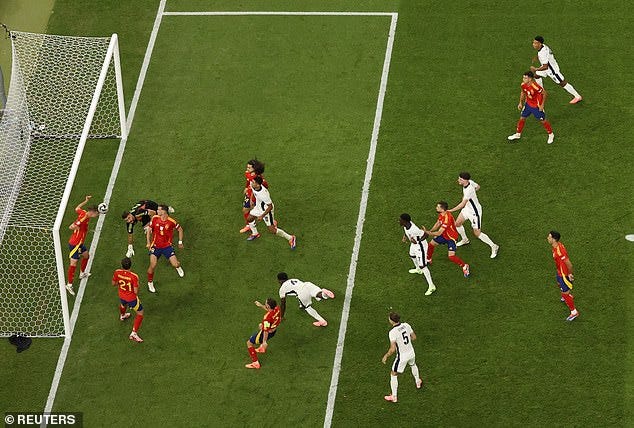We get to the pub some two and a half hours before kick-off, in an attempt to secure space at a table, but every seat is already taken, so we sit on a bench outside in an all-too-rare burst of July sunshine. The mood is jovial enough. The game is hours away and, in an attempt to reduce queues at the bar, the pub has decided to sell beer in two-pint plastic cups. It seems as though this is merely encouraging everyone to drink faster.
Half an hour until kick-off now and we’ve staked out our viewing spot; at the back of the pub, with a good view of the big screen and a window ledge to sit on. The screens are showing the match build-up, but the speakers are playing all the old songs. “Sweet Caroline” and, inevitably, “Three Lions” get an airing. We all sing along lustily to “Don’t Look Back In Anger”. This is all very wonderfully English.
The tension is beginning to crackle. Southgate appears on the screen. Nobody cheers, as they tended to in 2018, but despite the noise surrounding the England manager, nobody boos either. It’s the final now, too late to do much except hope and pray. A lot of people have told me this week that they have a feeling about the final. Even seasoned England watchers seem to genuinely believe this is our time. I don’t. But then I didn’t think we’d get past the Dutch.
The first half is a cagey affair, with Spain probing but to little avail. England don’t see much of the ball, but nor do they look overawed. For much of the opening forty-five minutes, a drunk Charlton Athletic supporter repeatedly tells me, also a follower of a terrible team, that lower league football is much better than the Premier League. His friends who support big clubs don’t understand football properly, he maintains. At half-time, one of these friends comes over and calls him a Cockney cunt and tells him to fuck off. This is all very English.
The final is goalless at the break, which feels like better news for England than Spain. There is a lot of nervous energy in the pub, but there is a lid on it for now. Two-pint cups are refilled, toilets are visited, and we’re back at it. Come on, we can do this.
As the second half starts, a brawl breaks out in front of us. One guy accuses another of stealing his seat while he was at the bar, and things escalate rapidly. The nervous tension has found an outlet. Bar staff wade in to throw people out. A girl caught in the melee has a panic attack and has to be taken outside by friends trying to calm her down. As if distracted by the goings-on, England start the second half poorly, and Spain score.
Kyle Walker tracks Dani Olmo’s run inside and suddenly nobody is covering Nico Williams, who slots past Jordan Pickford. The balloon bursts. Shoulders slump, hands rub faces, defiant shouts at the screen. That familiar sinking feeling that the game is running away from us. The fight about the chair breaks out again. This, sadly, is all very English as well.
Southgate makes the same substitution as the semi-final by sending on Ollie Watkins for a barely-mobile Harry Kane, who is surely carrying an injury. Then ten minutes later he hooks Kobbie Mainoo, who has had a wonderful tournament but is struggling tonight, and throws Cole Palmer into the fray. Two minutes later, Palmer fires home a shot from outside the area and the pub erupts.
Saka makes a run and picks out Bellingham. The ball runs behind him so with an outstretched leg he rolls it back, directly into Palmer’s path, who finishes beautifully. Suddenly there is beer in the air, people are hugging and standing on tables shouting, there is chaos and there is hope. This team, which has already come from behind against Slovakia and Switzerland and the Netherlands, they simply refuse to be beaten. Every time we’ve needed it, a moment of magic has dug us out. Maybe, maybe it is written in the stars after all. Maybe all those people who had a feeling were right.
And this, of course, is why football can be such a cruel game. It gives you hope, and then it snatches it away. Spain wobble for a few minutes, then begin to reassert control. With four minutes left, Oyarzabal beats Guehi to a Cucurella cross and slaps the ball into Pickford’s goal. The pub shifts from raucous anxiety to silent despair. Was it possibly offside? No, no respite this time. The “England ‘til we die” chant, sung with gusto just a few moments ago, now sounds more like a burden, a cross to bear, a curse. You’re telling me it’s going to be like this, forever?
Ivan Toney is brought on for Phil Foden, a player who, but for one magnificent half against the Dutch aside, has looked lost at these Euros. Though we don’t know it at the time, this is to be Gareth Southgate’s last substitution as England manager, his last roll of the dice. He will step down a couple of days after the final.
It has been impossible to talk about England in recent years without taking a position on Gareth Southgate; the constant carping and moaning from the usual quarters has become very wearisome, thuddingly predictable, a constant droning soundtrack to the England experience.
Part of the objection to Southgate all along, often unspoken, is that he has dared to be a thoughtful, considered liberal in charge of the England side. The team was booed for very publicly taking a stand against racism before matches at Euro 2020, a tournament which ended with the players who missed penalties facing racist abuse online. Perhaps their protests had a point. Gareth Southgate supported his players in taking the knee and defended them to the hilt, while others made a scene; Rent-a-gob Lee Anderson boycotted the matches, putting himself in self-isolation whilst the country had fun.
Southgate is transparently decent, a man of integrity, and through some tempestuous times for our country he represented a brand of Englishness which is tolerant, patriotic, comfortable with diversity, collectivist, quietly proud, liberal; an identity which found itself pushed to the side in the post-Brexit years but has recently reasserted itself across southern England to throw the Conservatives out of seat after seat. He understood that being England manager was more than just tactics, and he represented us admirably.
Southgate created an environment in which the players thrived; an England call-up was no longer a thing to dread but to look forward to. For a few years there, the England shirt seemed a lot less heavy, and instead we all had a good time of it – a lightness to the national team after years of dark. The joyously unexpected run to the World Cup semi-final in 2018; a first tournament final for 55 years in 2021; wins against Spain, Italy, Germany. Southgate has give us some wonderful moments, he allowed us to dream of a trophy for the first time in years. I’d never seen England reach a final, not in three decades. His England made two.
Euro 2024 felt different, like the tides of negativity were finally ready to sweep over England again, like the lights were going out. Southgate went into the tournament with one injured left-back and no idea of his best midfield. The team had no width and too many players converging on the same part of the pitch. There was no dynamism. Everything went sideways or backwards. The whole affair was much less meticulous preparation and much more building a team on the hoof, with the glorious exception of the perfect penalty shoot-out against the Swiss.
Yes, it often felt that Southgate set his England teams up with the handbrake on, that he sacrificed world-class attacking talent to make sure the side was solid and hard to break down. And that’s true. Perhaps his logic was that he had little time to weave players from different clubs into a cohesive system, and so bet the farm on a solid backline combined with moments of quality up front. Perhaps he realised that strikers win games but defences win tournaments. This approach predates Southgate in any case; every England manager since Kevin Keegan has essentially prioritised conservatism and caution. Maybe there is a reason for that, maybe it isn’t just managers being senselessly stubborn.
Often it seems like England fans forget that there are other capable teams in the world who also want to win, and they seem to believe that if we could only play a more attacking system, trophies would fall into our lap as surely as summer follows spring. Sure, maybe the next England manager will win consecutive tournaments with thrilling, swashbuckling football, and we’ll all wish we made a change sooner, but I suspect more likely is that the people who have spent eight years complaining about Gareth Southgate will simply switch to whinging about the new boss. And I suppose that’s all very English too.
After a brief flicker of excitement when Marc Guehi’s header is cleared off the line, the game is over, the lights come back on in the pub. There are conversations about the balance of the midfield not being right, about how we’ve got the core of a decent team for the years to come, about how we could do well at the next tournament. These are the sorts of things I’ve heard said in the aftermath of every elimination for the last thirty years. While it is the hope that kills you, it is also the hope that sustains you. I know it was then, but it could be again.
We all file miserably out of the pub and off into the night. But we’ll be back for the World Cup in two years, drinking and shouting and singing, because hope in defiance of experience is what we do. It’s all terribly English, after all.





